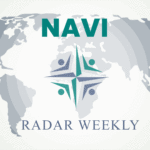Subscribe to NAVI Radar Weekly here
Focus Point: Regional Security- Transatlantic Security/European Security
Is Europe Becoming Ungovernable? |WSJ
By Bojan Pancevski |06.10.2024 | Subscription needed
Political fragmentation and polarization have tied the hands of political leaders, who can govern only in unwieldy coalitions between left- and right-leaning parties. Governments have struggled to find common ground on even basic issues, much less some of their most acute problems, such as handling growing numbers of immigrants, the war in Ukraine and stagnant economies.
“Leaders are not—and will not be—able to build majorities around a consensus for doing what’s needed, and the absence of decisive reforms to tackle the drivers of the populist surge, such as the weak economy and mass migration, is reinforcing this vicious circle,” said Mujtaba Rahman, a senior director with the Eurasia Group consulting firm and a former EU official.
As a result, the EU and its governments have been failing to fulfill their commitments to voters and risk falling further behind competitors such as the U.S. and China.
At the same time, higher borrowing costs and sluggish growth are putting fiscal pressure even on erstwhile powerhouses such as Germany. Read more…
Focus Point: Regional Security- Transatlantic Security
Unleashing US-EU defense cooperation|Atlantic Council
By Rachel Rizzo | 07.10.2024
The bottom line
Instead of pushing back against European defense efforts as it has done in the past, Washington must fully embrace the steps the European Union (EU) is now taking—including the European Defense Industrial Strategy—and build on nascent structures for US defense cooperation with the EU.
State of play
For decades, the United States has derided and complained about the EU’s lack of defense capabilities. Why doesn’t the EU step up to the plate? Why can’t it handle more of the burden of Europe’s continental defense? Questions regarding the US commitment to Europe’s defense go all the way back to the Eisenhower era: The then-president “lamented that the insufficient defense efforts of US allies in Europe meant that the Europeans were close to ‘making a sucker out of Uncle Sam.’”
The reality, however, is a bit more complicated. The United States has also played an active role in stymieing the EU’s defense capabilities throughout the years, repeatedly warning about the EU implementing protectionist measures, and defense primes worrying about lost contracts.
The opposition from many in Washington ranges from concern about the United States eventually being pushed out of Europe’s defense market at best, and the dissolution of the US-European relationship at worst. Take the case of the US reaction to the 1998 St. Malo Summit: British Prime Minister Tony Blair and French President Jacques Chirac signed the St. Malo Declaration, declaring that the EU “must have the capacity for autonomous action, backed up by credible military forces.” US Secretary of State Madeleine Albright responded shortly thereafter at a NATO foreign ministerial with the famous “three D’s” speech, saying there should be no discrimination against, no diminution of, and no duplication of NATO activities. This has been US dogma ever since. Read more…
Focus Point: Regional Security- Transatlantic Security/European Security
The New European Commission’s Distorted Democracy Agenda |carnegieendowment
Richard Youngs and Elene Panchulidze| 08.10.2024
The EU’s focus on security has caused it to shift from a proactive to a defensive democracy support strategy. As a new institutional cycle begins, the union risks downgrading its global democracy promotion efforts too much and relinquishing one of its distinctive geopolitical advantages.
With the clear primacy of security issues in the new European Commission’s priorities, the place of democracy support in the EU’s geopolitical toolbox looks increasingly uncertain.
The new commissioners’ mission letters are long on the EU interests to be defended and silent on support for democratic norms internationally. Yet the way the EU has traditionally engaged in democracy support was part of its distinctive brand of foreign policy, helping to solidify partnerships with reforming governments and societies around the world.
Nevertheless, the EU’s commitment to supporting democracy internationally has plateaued or in many places weakened in recent years. Member states have become more reluctant to use sanctions or conditionality against autocratic governments and democracy funding has become a small fraction of the amounts invested in other priorities like defense, according to the annual audit of EU democracy policies Carnegie Europe carries out in the context of the European Democracy Hub. Read more…
Focus Point: Regional Security- Africa
Coups & Consequences: Civil-Military Relations in Crisis | War Room-USAWC
By Naunihal Singh |08.10. 2024
The recent surge of coups d’etat in Africa holds significant implications for U.S. foreign policy. Dr. Naunihal Singh, author of Seizing Power: The Strategic Logic of Military Coups, joins host Carrie Lee to discuss his extensive research on this topic. They explore the definition and historical context of coups, examining the intricate dynamics involved. Dr. Singh’s insights, particularly on the role of mid-grade military officers, offer a unique perspective on this complex issue, crucial for those interested in civil-military relations and the future of democracy. Read more…
Focus Point: Regional Security- Transatlantic Security/NATO
The US elections and the future of NATO: A scenario analysis | Clingendael
By Dick Zandee, Roman de Baedts| 10.10.2024
The NATO Washington Summit in July 2024 demonstrated unity on important issues like the support for Ukraine, the strengthening of the Alliance’s deterrence and defence posture, the Russian threat and the challenges posed by China. Yet, on the road to the next NATO Summit in June 2025 in The Hague many obstacles could appear, quickly turning the positive tone into a dissonance. As the United States is the most important Ally and its commitment to the security of Europe is regarded as a key factor of NATO’s credibility in collective defence, the outcome of the US presidential elections on 5 November 2024 will have a great impact on the future of the Alliance.
As the consequences resulting from the US presidential elections on the Alliance and on European security may be very different, it is hard to draw a clear conclusion before 5 November or even early 2025 when the new President will enter the White House.
Depicting a set of possible scenarios might help to gain more insight on the impact of the 2024 US elections, depending on who will occupy the Oval Office and which security policy may be pursued by Washington. A scenario analysis may also assist Allies in their preparations to react to the outcome of US elections and, therefore, in NATO’s agenda-setting for the next Summit in The Hague in June 2025.
- Scenario 1 – Better burden-sharing
- Scenario 2 – Transactional security
- Scenario 3 – Partial US disengagement
- Scenario 4 – US leaving NATO Read more…
Focus Point: Regional Security- Middle East
Russia’s Potential Alliance with Hizbollah: A Strategic Challenge for the EU in the Eastern Mediterranean | EGMONT
By Bernard Siman | 10.10.2024
One year on, the debate has been dominated by Israel, Hizbollah and the potential for regional war in the Middle East. An additional credible scenario has been worryingly absent: that in which Hizbollah and Russia cooperate, not necessarily to the exclusion of Iran as a third leg in a tripartite alliance. This scenario combines geography, history and geopolitics to bring Hizbollah and Russia closer together as a force to recon with. This is a possible development in the Southern Neighbourhood and the Levant that the EU needs to take seriously. Missing Russia’s potential move on Hizbollah could be an historic omission.
An additional credible scenario has been worryingly absent: that in which Hizbollah and Russia cooperate, not necessarily to the exclusion of Iran as a third leg in a tripartite alliance.
The decapitation of Hizbollah’s chain of command that preceded the ground incursion, and Iran’s feeble reaction to the devastating assault on its Lebanese proxy, have created a new geopolitical vacuum and reality in the Eastern Mediterranean. Russia may spot an opportunity in the misfortunes of Hizbollah and move on a weakened prey.
Will Russia’s direct influence return to Beirut for the first time since the 1770s when it occupied the city for a few months following the naval defeat of the Ottoman fleet at the battle of Cheshme? It is a distinct possibility, especially given Iran’s lukewarm military response, and one that the EU, and member states, must be prepared to deal with, if not pre-empt and prevent. Read more…
Focus Point: Emerging Technologies & Data- Artificial Intelligence
AI and Intelligence Analysis: Panacea or Peril? | War on the Rocks
By Noah B. Cooper| 10.10.2024
In today’s chaotic world, professional intelligence analysts must contend with nearly endless data streams, which risk overwhelming them while also exacerbating the impact of cognitive biases. Is AI the answer, or do the flaws that currently afflict AI create yet more risks?
AI is not an instant “out of the box” solution but...
In fact, AI is neither a panacea nor a peril. Like other emerging technologies, AI is not an instant “out of the box” solution but rather a capability that continues to evolve. Today, AI can augment human capabilities and enhance the analysis process by tackling specific challenges. However, AI is not without issues. This means its value lies in serving as a complementary capability to the expertise and judgment of human intelligence analysts.
Before the wholesale adoption of AI in support of intelligence analysis, it is essential to understand the specific problems facing analysts: coping with large volumes of data; the acquisition of data from non-traditional sources; and, perhaps most vexing of all, the impacts of cognitive biases that impact the objectivity of intelligence assessments. AI can play a valuable role in alleviating these challenges, but only if humans are kept in the loop. Read more…
Focus Point: Regional Security- Transatlantic Security/NATO
NATO holds annual nuclear exercise: Steadfast Noon | NATO
By NATO | 11.10.2024
NATO will begin its annual nuclear exercise “Steadfast Noon” on Monday (14 October 2024) with more than 60 aircraft taking part in training flights over western Europe. Steadfast Noon runs for two weeks and involves fighter jets capable of carrying U.S. nuclear warheads, but does not involve any live weapons. Read more…
Focus Point: Regional Security- Africa
The Sahal: A New Arena for Geopolitical Competition | NAVI Research Institute
By Ana Aguilera Junior Research Fellow |13.10.2024
The new reality in the Sahel, characterized by a strengthened bloc-based policy, confirms that the region has become a new arena for geopolitical competition among major and middle powers. International relations in the Sahel are marked by rising tensions, with various countries pursuing conflicting agendas to gain influence and strategic positioning over their geopolitical rivals. Examples include Ukraine’s active involvement in Sahel conflicts by supporting armed groups in northern Mali to counter Russia’s role or Mauritania’s struggles with some of its worst episodes of externally instigated protests. Indeed, the EU and the United States are working to curb Russia’s advance into new countries, having succeeded so far with Mauritania at a time when the U.S. and Russia seek to delineate their revisited lines of influence in the Sahel, for which Mauritania is a key piece in the international political roadmap. Read more…
Focus Point: Security and Defense Policy- The EU-Migration
Poland to suspend right to asylum as ‘hybrid war’ escalates on Belarus border | Politico
By Gabriel Gavin| 12.10.2024
Poland will temporarily bar refugees from claiming asylum in the country after crossing the border from neighboring Belarus, amid warnings that Russia and its allies are using migrants to try to destabilize the EU.
Russia and its allies are using migrants to try to destabilize the EU.
Speaking on Saturday at a meeting of the governing Civic Coalition party, Polish Prime Minister Donald Tusk said that a new migration strategy would include “the temporary territorial suspension of the right to asylum.”
“I will demand this,” insisted Tusk, a former president of the European Council, pre-empting challenges from Brussels over the legality of the move. “I will demand recognition in Europe for this decision.” Read more…
Thank you very much for reading.
The NAVI Research Institute is the research division of NATO Veterans Initiative - NAVI that provides a unique perspective to transatlantic leaders and societies on peace and security through the lens of NATO's founding principles of rule of law, democracy, human rights, and individual liberties. The NAVI Research Institute was officially established by the NAVI Board on July 16th, 2023.

![NAVI-PROJE-[Recovered] Radar Weekly](https://nato-veterans.org/wp-content/uploads/2024/05/NAVI-PROJE-Recovered-696x392.gif)

